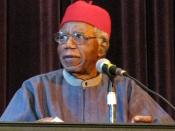�PAGE � �PAGE �2�
Things Fall Apartij
001
Memory/Documentary: Digression is one of Achebe's main tools. The novel is the story of Okonkwo's tragedy, but it is also a record of Igbo life before the coming of the white man. The novel documents what the white man destroyed. The reader learns much about Igbo customs and traditions; depicting this world is a central part of the novel.
Social disintegration: Towards the end of the novel, we witness the events by which Igbo society begins to fall apart. Religion is threatened, Umuofia loses its self-determination, and the very centers of tribal life are threatened. These events are all the more painful for the reader because so much time has been spent in sympathetic description of Igbo life; the reader realizes that he has been learning about a way of life that no longer exists.
Greatness and ambition: Okonkwo is determined to be a lord of his clan.
He rises from humble beginnings to a position of leadership, and he is a wealthy man. He is driven and determined, but his greatness comes from the same traits that are the source of his weaknesses. He is often too harsh with his family, and he is haunted by a fear of failure.
Fate and free will: There is an Igbo saying that when a man says yes, his chi, or spirit, says yes also. The belief that he controls his own destiny is of central importance to Okonkwo. Later, several events occur to undermine this belief, and Okonkwo is embittered by the experience. As often happens with tragedy, the catastrophe comes through a complex mix of external forces and the character's choices.
Masculinity: Masculinity is one of Okonkwo's obsessions, and he defines masculinity quite narrowly. For him, any kind of tenderness is a...


